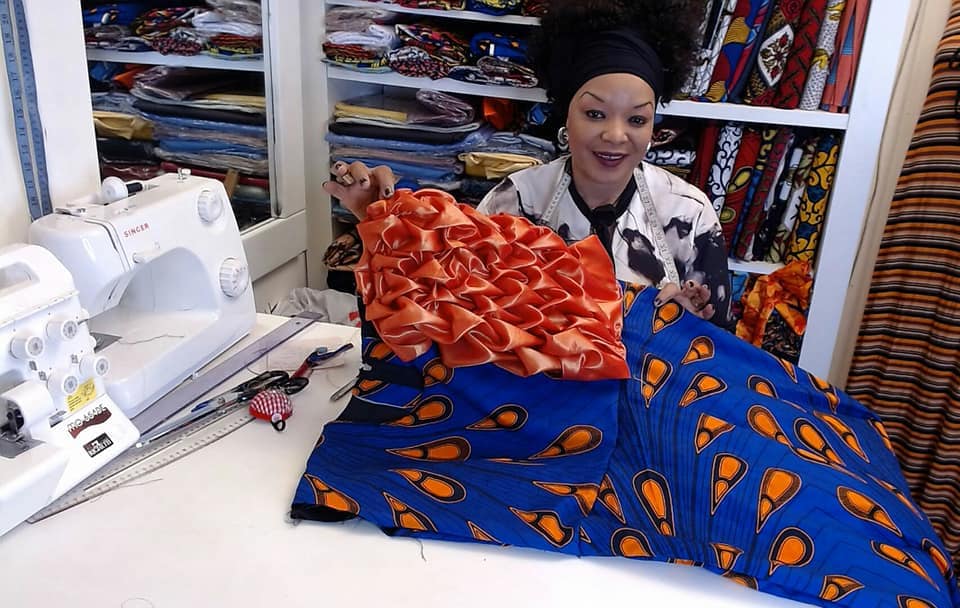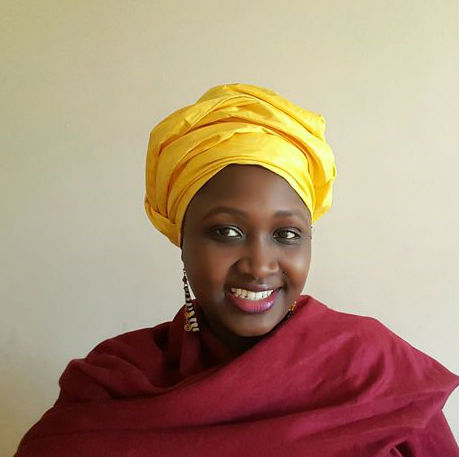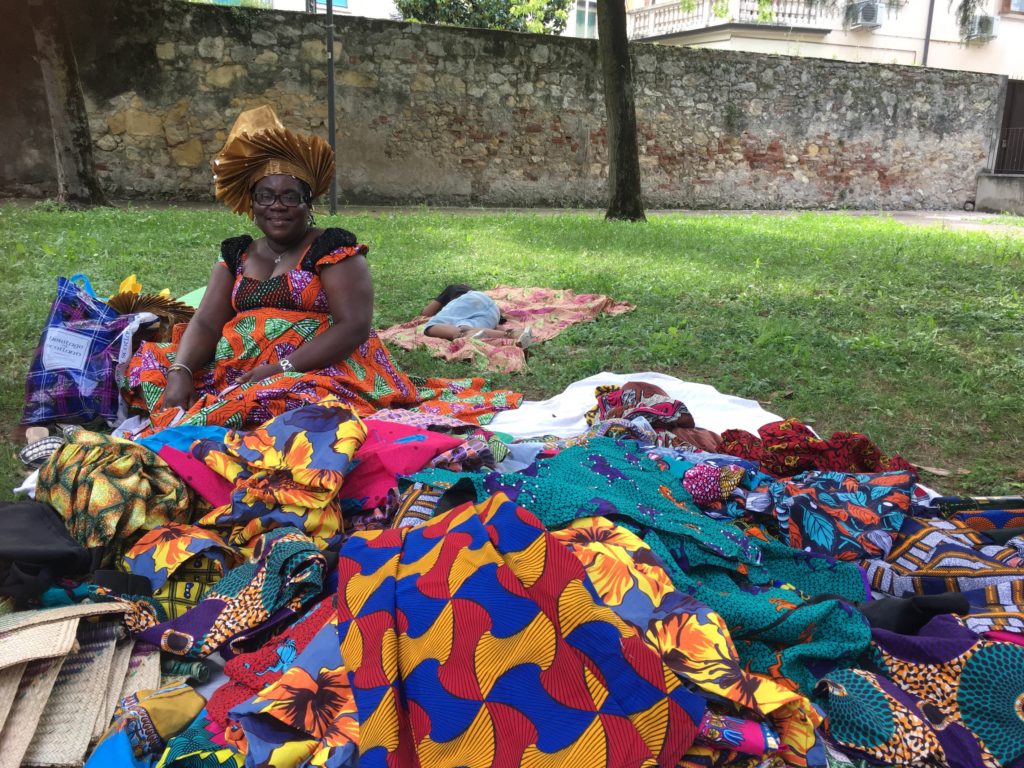Attending events Hosted by women’s Organisations in Glasgow, I witnessed refugee women’s inspiring resilience, solidarity, creativity, and invaluable contributions to Scotland.
by Laura Ndanuko
In Scotland, the annual Refugee Festival, themed ‘RISE’ this year, welcomed and captivated audiences from June 14th to 23rd, leading to World Refugee Day on June 20th.
The festival featured diverse events, amplifying refugee voices through storytelling, cultural performances, discussions, workshops, food, art and craft exhibitions. These celebrations highlighted refugee communities’ rich talents and traditions and fostered a sense of inclusivity, enriching Scotland’s cultural landscape.
I have often wondered whether this series of events has a positive impact. To find answers, I decided to attend some of these events in Glasgow, focusing on those organised by women.
Elevate Your Connections and Rise Together – Women’s Integration Network (WIN) in Partnership with Glasgow Chinese Recreation Centre (GCRC)
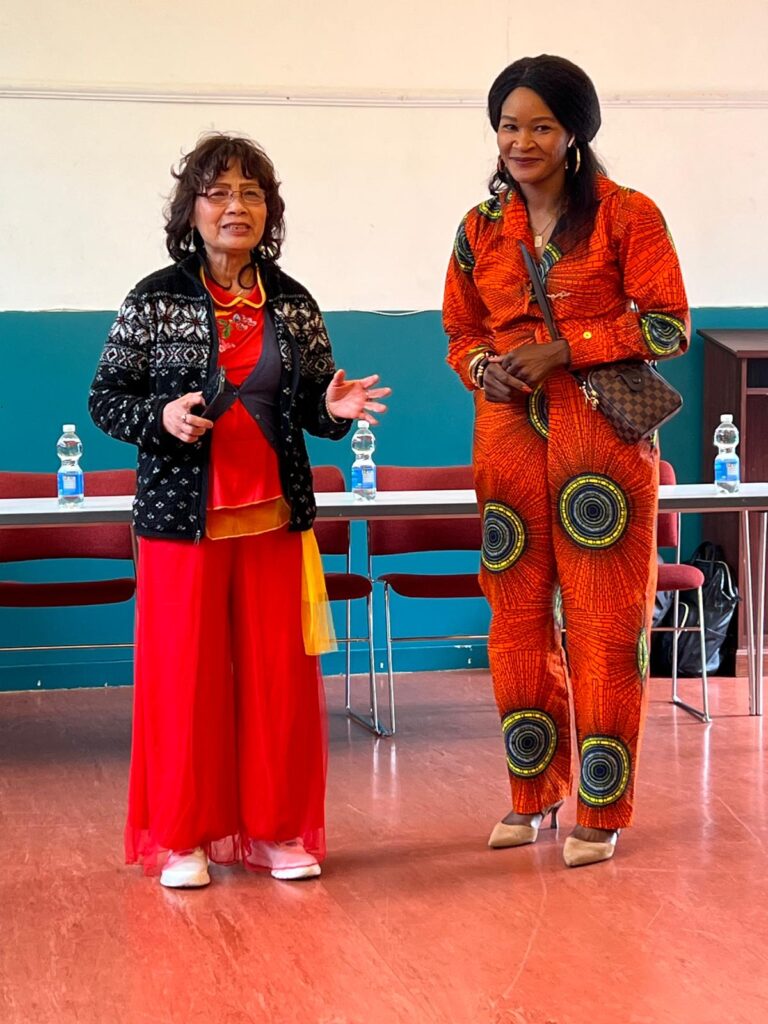
Unity and intercultural dialogue were at the heart of this unique event, as Olivia Ndoti, the founder of WIN -Women’s Integration Network and Mary Lam, a chairperson from GCRC – Glasgow Chinese Recreation Centre demonstrated during the official opening ceremony.
One of the standout activities was a cooking demonstration on how to make Jollof rice, a traditional West African dish. Led by Bimbo, a member of WIN, she explained how to prepare this Nigerian staple, rich with spices and flavours that tell the story of her culinary heritage.
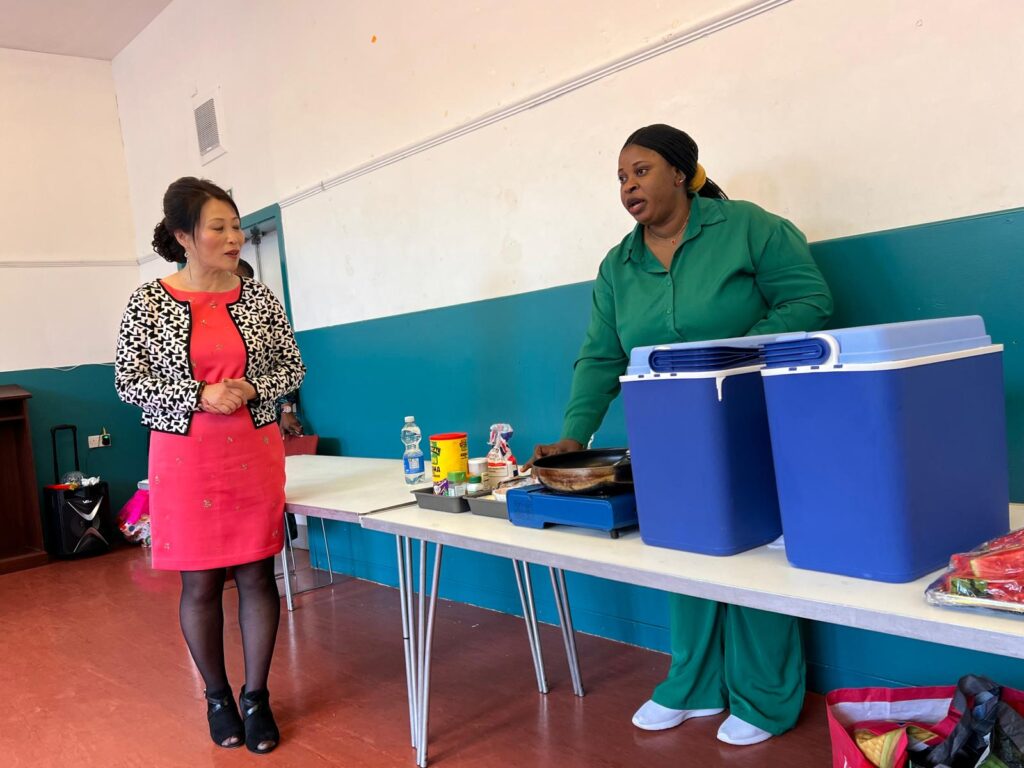
A thoughtful and inclusive gesture ensured everyone could fully appreciate the demonstration: a Chinese community participant stood by Bimbo’s side to translate for her peers. As Bimbo described the step-by-step process, the translator echoed her words in Chinese with equal enthusiasm, ensuring no one missed a beat. The room was filled with nods of appreciation and smiles, reflecting a shared joy in learning something new.
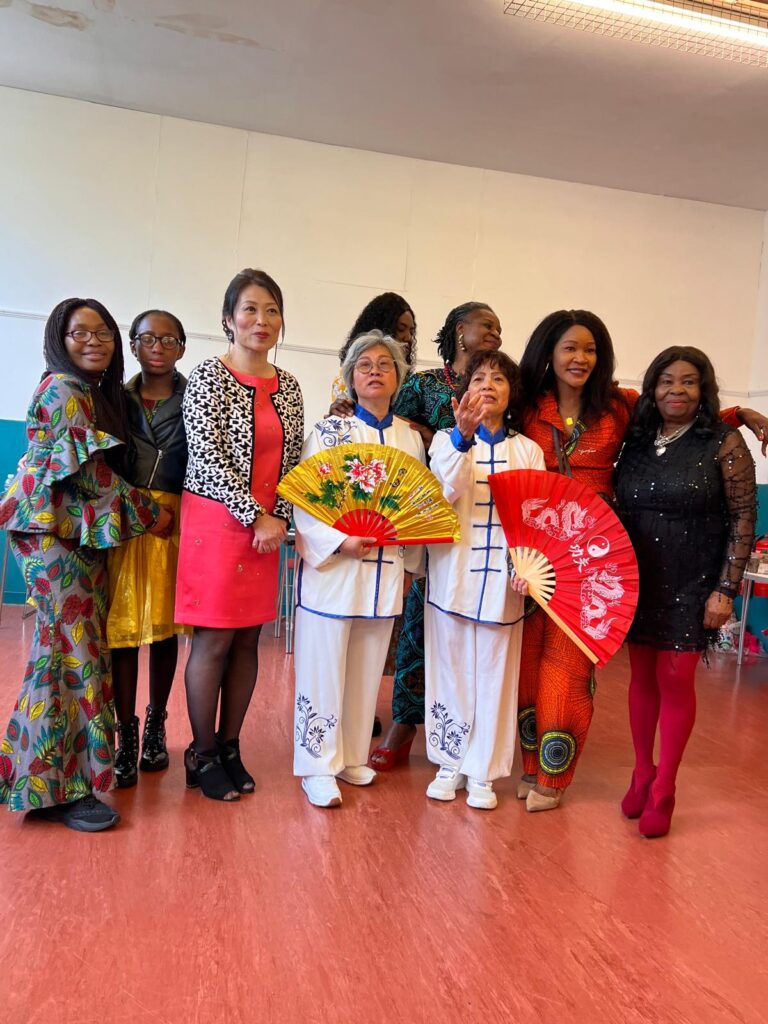
Two beautiful dance presentations by participants from the Glasgow Chinese Recreation Centre (GCRC) were highlights of the program. The choreography masterfully blended traditional and contemporary elements, celebrating Chinese culture. The dancers’ attire was a feast for the eyes—bright reds and rich golds adorned with intricate embroidery, paired with ornate fans and long pink sashes that added to the fluidity of the performance. With graceful precision, the dancers glided across the floor, their movements seamless and elegant. As the final note played, the dancers took their bow, and the room erupted in applause.
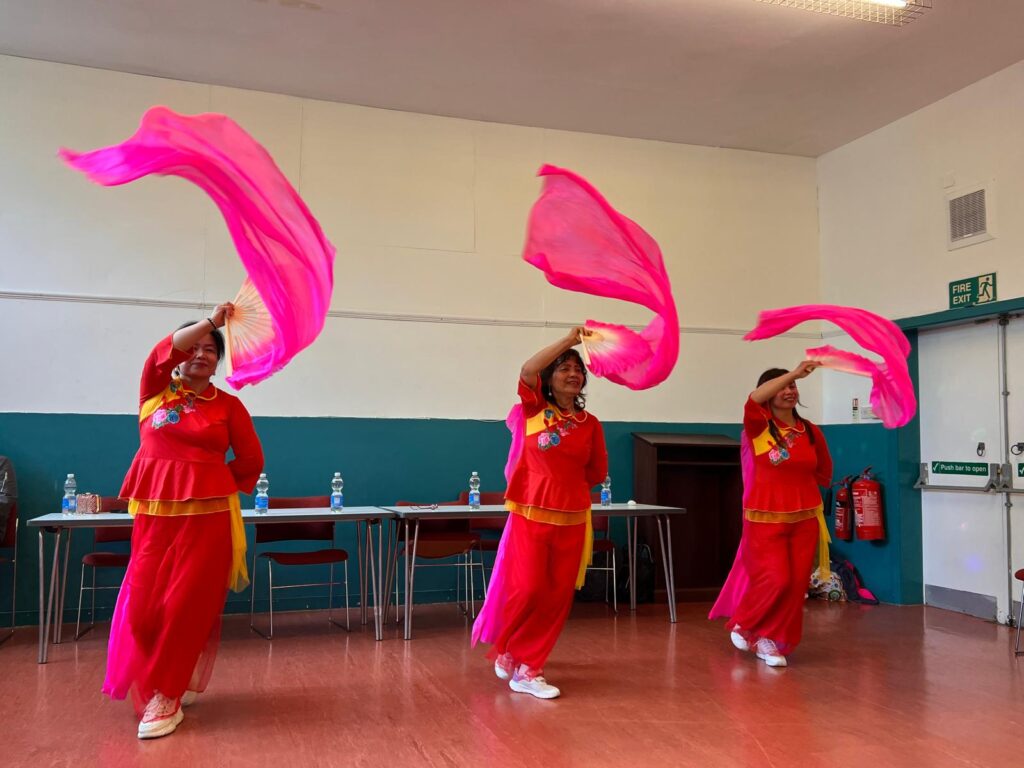
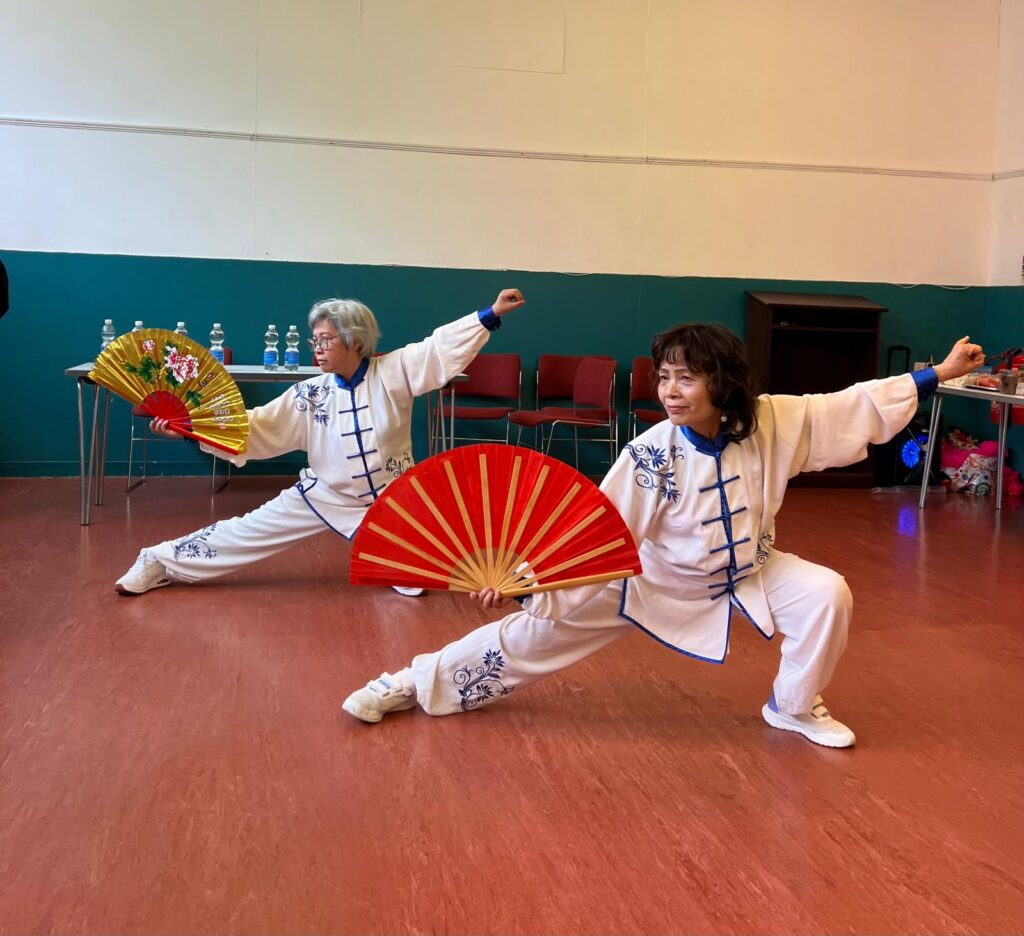
Following the performances, volunteers from both groups enjoyed a flavorful buffet featuring meals from Africa and China. The spread was a nourishing delight, with an array of dishes complemented by cans of Irn Bru, adding a touch of Scottish celebration. This gathering, where African and Chinese communities came together to dance, laugh, and dine, marked a significant milestone in the cultural dialogue.
I had the opportunity to speak with Mary Lam, a leader and one of the dancers from the Glasgow Chinese Recreation Centre (GCRC). She expressed her happiness in sharing the space with people from another group and emphasised the importance of having community spaces like theirs. She highlighted how these spaces combat isolation and encourage integration by offering dance and Tai Chi classes and serving meals every Wednesday and Friday.
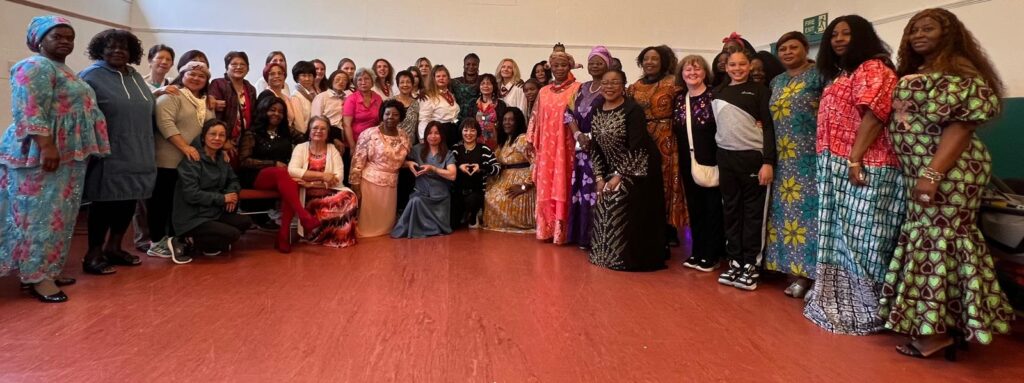
The event exemplifies how we can change narratives of isolation, racism, and microaggressions by bringing diverse communities together. Virginia, one of WIN’s members, remarked, ” It was really nice to be able to display our culture without discrimination.”
Just as we thought the event was ending, Solo Way, a choir of Ukrainian women, joined us and delighted everyone with their captivating music. Led by the charismatic Bozhena Yakymenko, the choir of beautiful, strong women adorned in red beads over white shirts stood tall as they performed. Their repertoire ranged from lively songs to poignant reflections on their homeland. Their presence underscored the festival’s theme of unity among diverse communities.
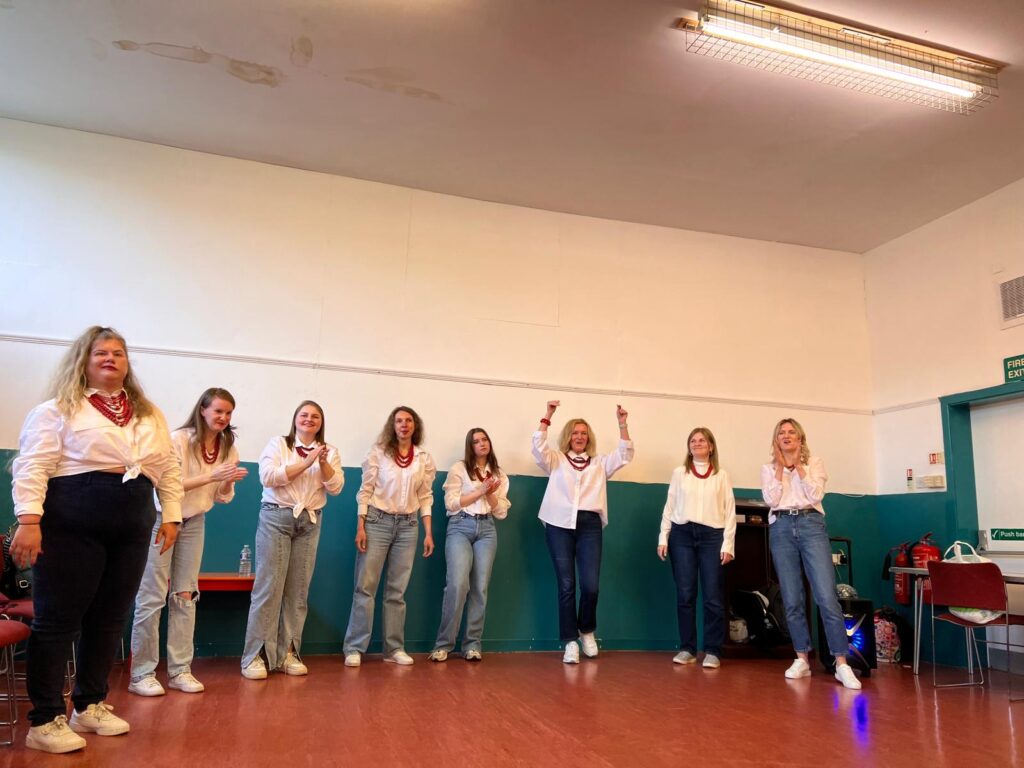
On the day, photos capturing beauty, hope, love, and strength were taken while women joyfully chanted, “Africa, China, Ukraine, and Scotland!” This vibrant display of unity and solidarity perfectly encapsulated the festival’s spirit.
Documentary Film Screening – Surviving Translation by Ling Lee, based on original research by Charlotte Bosseaux
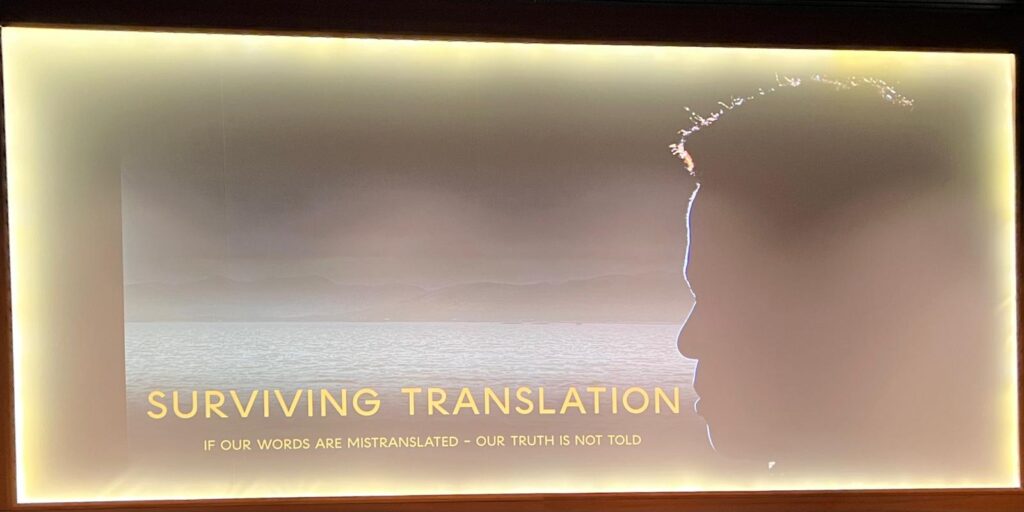
Initially sceptical, my perspective shifted profoundly during a film screening on June 18th at the Glasgow Film Theatre. Directed by Ling Lee and based on Charlotte Bosseaux’s research, Surviving Translation delves into the traumatic experiences faced by migrant women upon arriving in a new country where they did not speak the language. Testimonials from translators and interpreters further enrich the film, offering a unique and poignant perspective on the challenges of integration and communication.
Highlighting the dangers faced during their journeys, the film evoked chills and tears throughout the room as we watched, listened, and reflected. It also provided a perspective on the translators and interpreters who spend hours translating or subtitling tapes. These professionals often have to listen to traumatic experiences repeatedly to achieve accuracy, which can unlock painful memories for them as well, among other challenges.
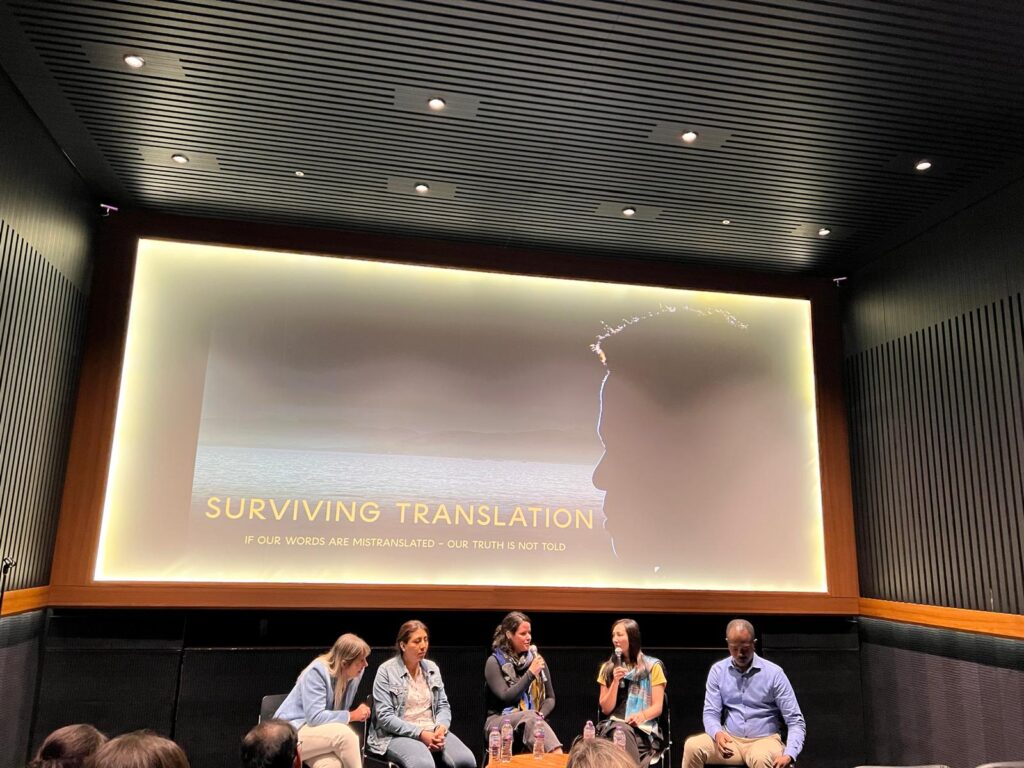
After the screening, a panel discussion featured one of the women participants from the film and the director. They guided us through the filmmaking process and addressed questions and concerns, including the thought-provoking issue of artificial intelligence. A central question was whether AI has advanced enough to pick up nonverbal cues, pauses, changes in breathing, or body language when transcribing or translating.
The film educated attendees on the critical importance of accurate translation, showing how mistranslation can alter one’s fate, especially when it is essential to prove one is in danger. The raw emotional accounts in the film, woven with evocative imagery and sound, challenged my initial doubts and compelled me to consider how such events can impact public awareness and empathy.
Rise Together – Sewing2gether All Nations
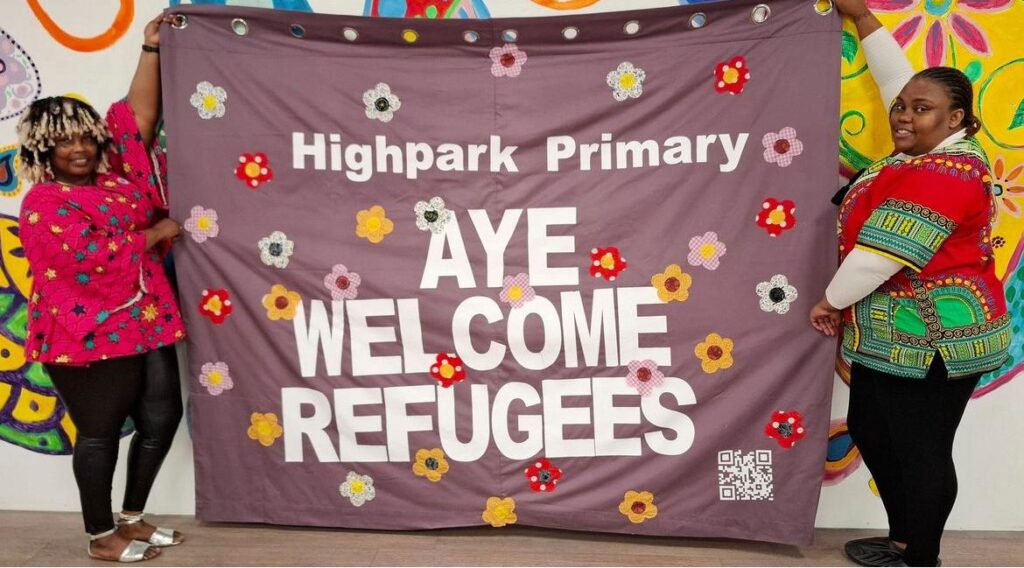
On a fine Wednesday morning, I attended the “Rise Together” event in Paisley, organised by Sewing2gether All Nations at the Teardrop Explodes exhibition at the Paisley Centre Arts Department. A collection of colourful banners made from upcycled fabrics was unveiled to the group’s partners, participants, and volunteers. These bold banners, bearing the radical message “AYE REFUGEES ARE WELCOME,” were crafted from donated curtains, duvet sets, and clothing, symbolising the strength and resilience of the refugee community.
Thekla, a volunteer with Sewing2gether All Nations, shared her experience, saying that life has become easier since joining the group. She emphasised the support she receives and the opportunity to lead a purpose-driven life, even as the asylum system remains challenging for migrants.
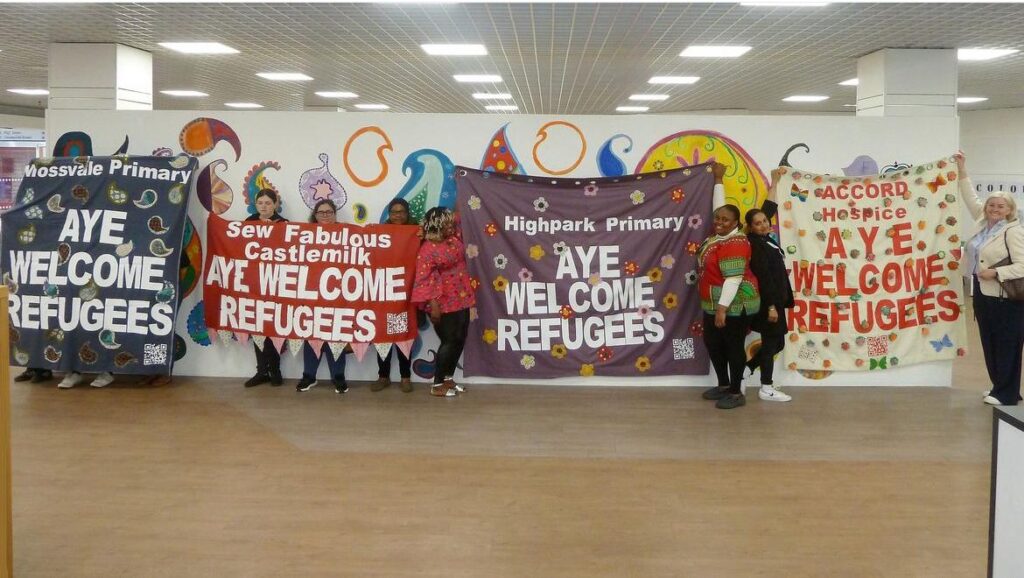
Thekla looked stunning in her red Paisley pattern dress, a design that dominated the space, which featured art, clothing, and an installation by Sewing2gether All Nations. The exhibition showcased people’s memories and connections to Paisley. Among the displays were postcards sharing stories of individuals for whom Paisley has been a home, workplace, church or place of cherished memories.
A standout piece was a large tree drawn on repurposed fabric, with each silky petal handcrafted, symbolising these connections. This artwork, created by Persian artist Razieh Safraz for a previous project, “Paisley Conversations,” beautifully tied together the community’s shared experiences and cultural heritage.
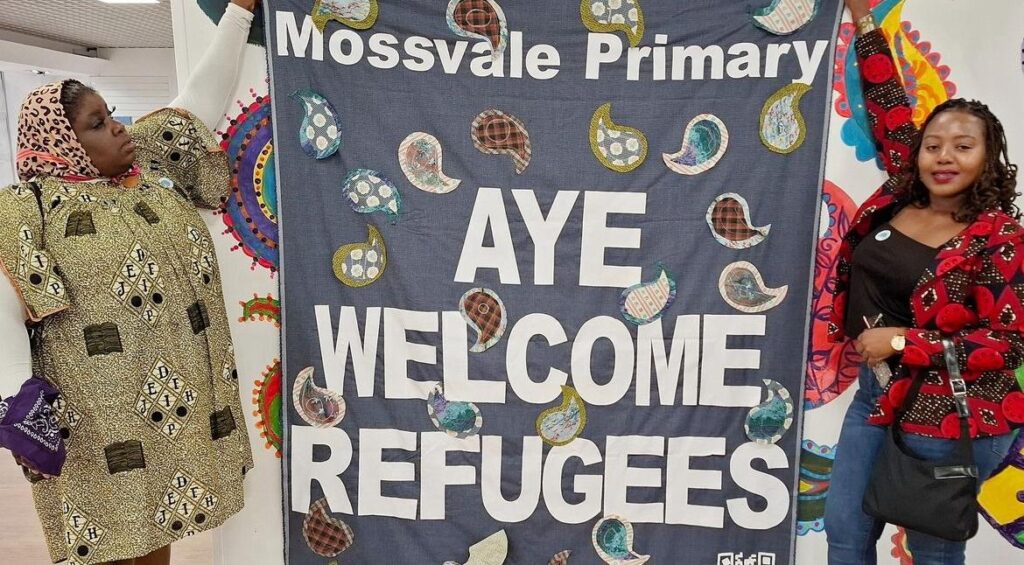
The group sets a great example of sustainable fashion, collaboration and community spirit. In various workshops, they collaborated with Accord Hospice, Mossvale Primary School, Sew Fabulous and The Castlemilk Pantry to make the banners unveiled on the day. During the event, participants introduced themselves by passing a globe around sharing their names, origins, and current places of residence. This unique approach celebrated culture and diversity while promoting community engagement and unity.
Kairos Kitchen – Kairos Women+
Continuing my exploration, I participated in a celebration by Kairos Kitchen, a group from Kairos Women+, on Thursday. Initially starting as a recipe-sharing group for Black, Asian, and Minority Ethnic Women+, it has grown into a significant force within the Kairos Women+ community and the lives of its participants. This strength inspired them to reach out to the local community, sharing food, insight, and dance—the core values of Kairos Kitchen.
On the day of the event, the large, well-lit space was filled with men and women from various backgrounds. At the front, a bunting of flags made by Creative Cafe, another group within Kairos Women+, added a festive touch. The celebration embodied the spirit of cultural exchange and community engagement.
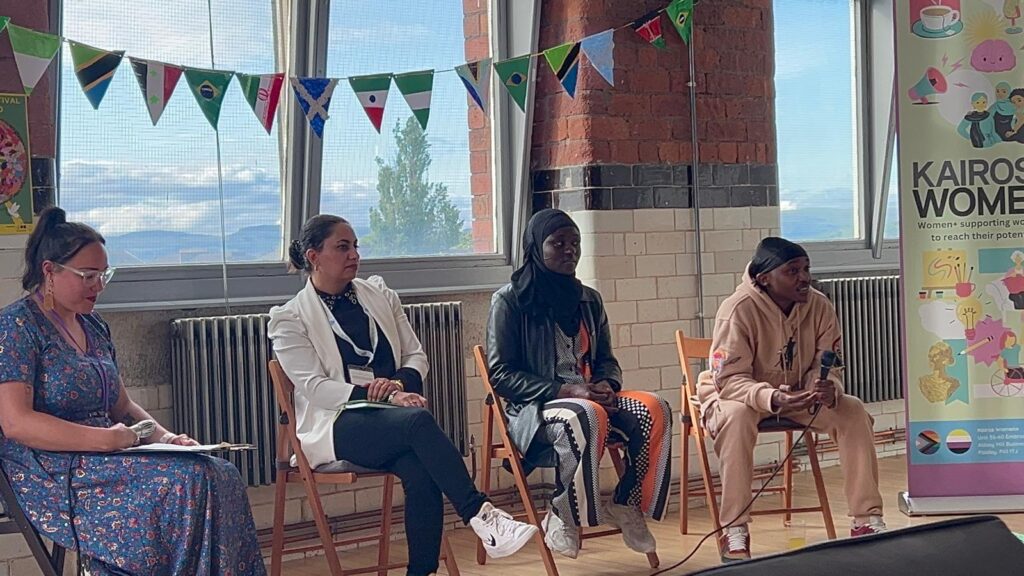
Abril, the MC of the evening, opened the event with a warm welcome and invited me to speak about our group, as I am one of the members. I felt immense pride as I shared my experiences and the transformative changes in my life and encouraged other women to join us.
Following my speech, Abril, one of the staff members at Kairos, led a panel featuring three inspiring individuals: Razieh, Safinatu, and Antony. They shared their journeys since arriving in Scotland, recounting stories of endurance, hard work, and passion. Their words inspired and educated us, particularly when they urged us never to give up. Phrases that resonated deeply included, “Stay curious,” “Help a refugee now, and they will help you soon,” and “Do not be afraid to show your skills.”
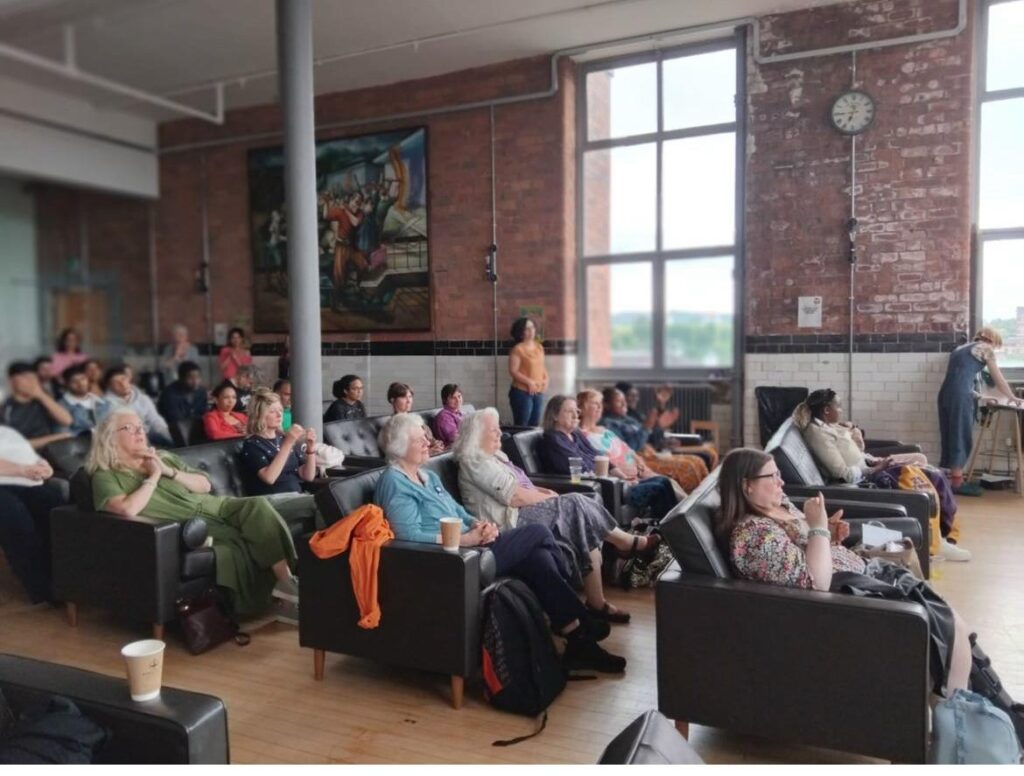
After the panel, the evening continued with a heartwarming song performed by two confident children. Their performance set a joyful tone, followed by the serving of food the group had prepared earlier. As people enjoyed their meals, they engaged in conversations and had the opportunity to interact with the panellists.
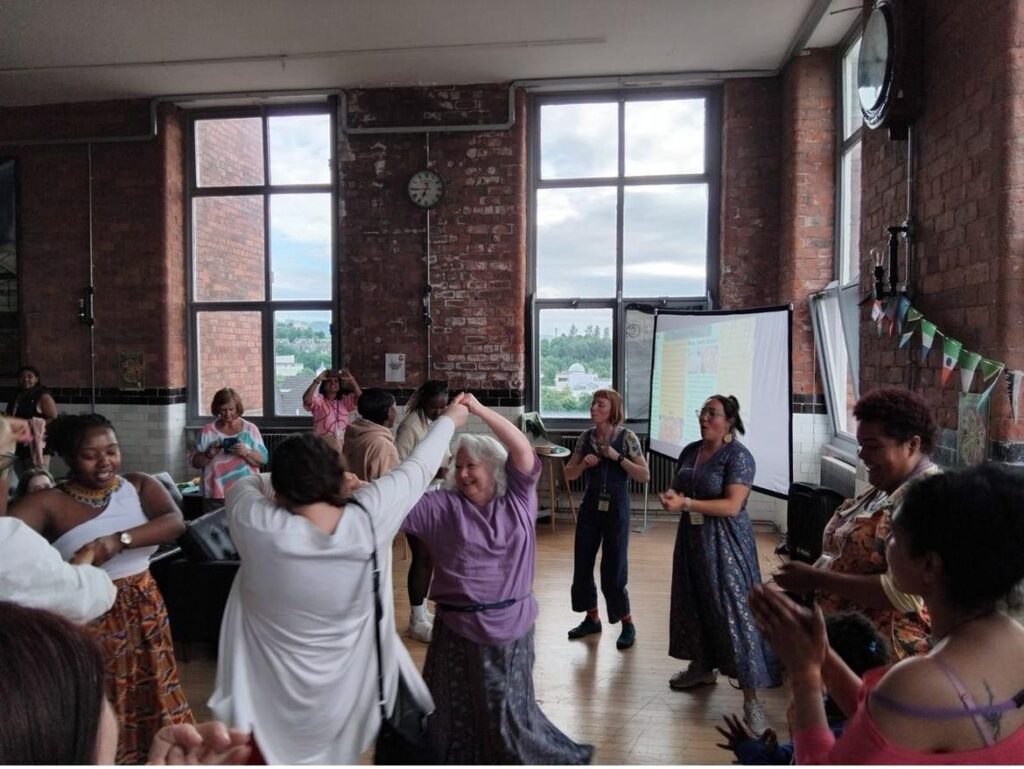
The event concluded on a high note, with participants joyfully dancing to the famous Macarena and songs from around the world. It was a great celebration that underscored the community’s strength and unity, highlighting how shared experiences and cultural exchange can empower and uplift everyone involved.
African Women Rise – Sharpen Her :The African Women’s Network (SHAWN)
At the final event I attended, I listened to a series of inspiring stories from powerful women who are transforming lives by empowering others and displaying remarkable resilience in their efforts to integrate into the Scottish community. The event was hosted by Angie Mwafulirwa, the founder of SHAWN (Sharpen Her: The African Women’s Network).
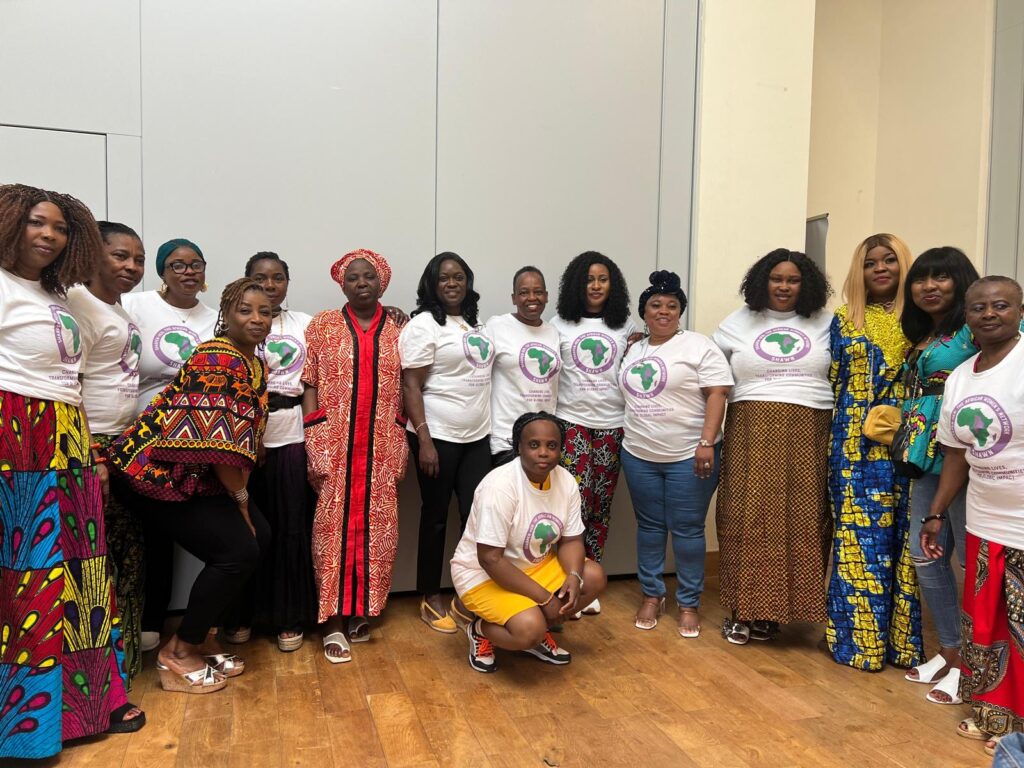
The “African Women Rise” gathering stood out to me. I arrived just in time for a showcase by Priscilla Mandona, a highly motivated woman and the founder of POCE (People of Colour in Education). This organisation aims to empower people of colour to reach their maximum potential in education. They work to remove barriers and advocate against injustices within the education system.
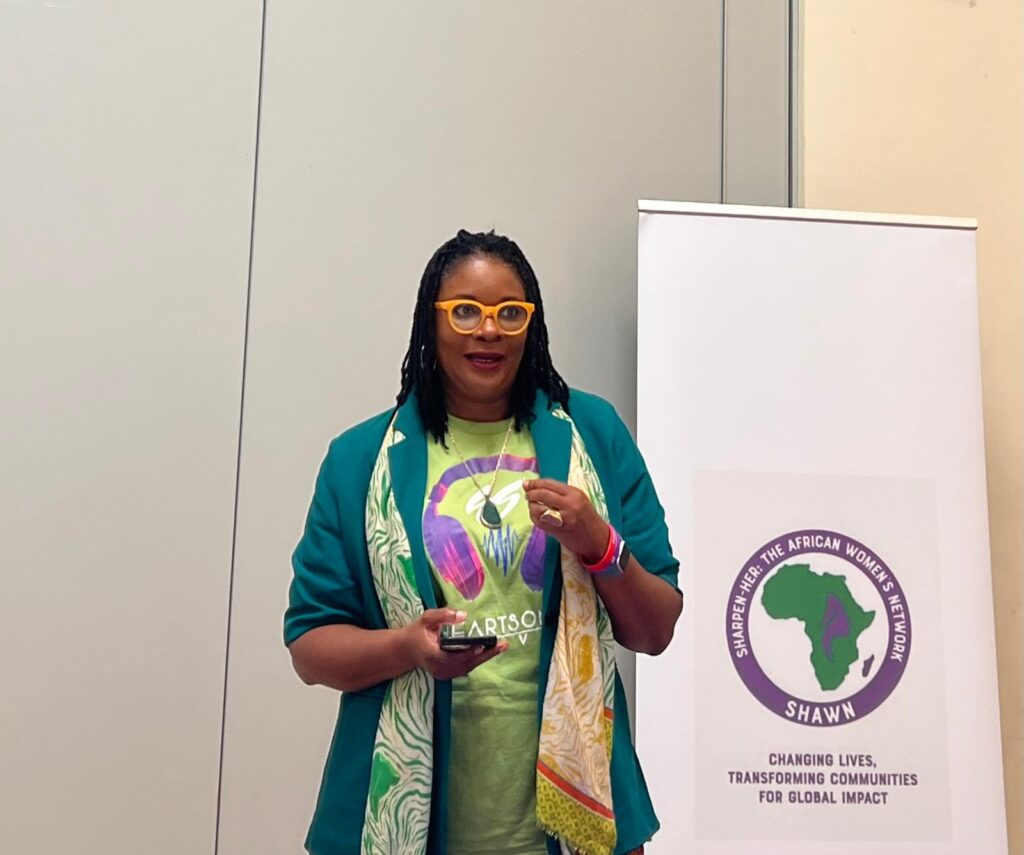
Following that was an inspiring talk by the phenomenal Eloho Efemuai, a singer-songwriter, author, certified coach, broadcaster, and the first Black female to run a Christian radio station. She shared her powerful story of overcoming trauma and breaking cycles, finding strength in her faith and within herself. Eloho’s journey is one of continuous growth, where each day brings new opportunities to learn, teach, support, and evolve. Through her pain, she has risen and become a pillar of the migrant community in Scotland. She concluded her talk with a poignant recitation of Maya Angelou’s poem, “Still I Rise.”
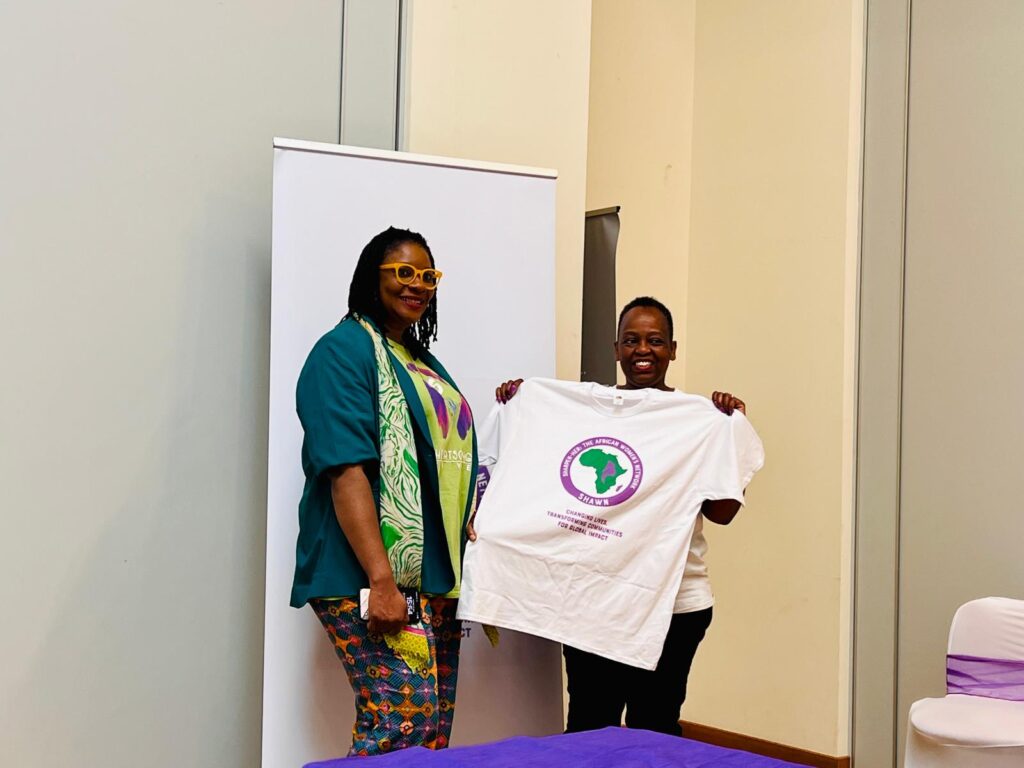
Afterwards, there was time to share a meal and engage in conversations. Just as we were about to dine, a women’s group called SHINE Your Light joined us after leaving their own function early, adding another positive story of unity to the event.
Reflecting on the week, I realised that each event was crucial in deepening my understanding and empathy for refugees. The educational workshops, exhibitions, empowerment fairs, and community activities collectively fostered a comprehensive and nuanced perspective. I began with scepticism but ended with a profound appreciation for the festival’s capacity to engage in such events to promote a more inclusive and supportive community.
Laura Ndanuko is Migrant Women Press trainee journalist. She is from Kenya and lives in Scotland. Passionate about community development, she dedicate her time empowering women and amplifying stories of hope. Through storytelling, she aims to inspire others to join her in building a brighter future for all.

